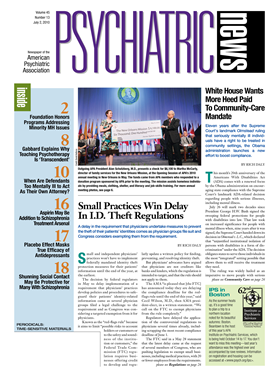This month's 20th anniversary of the Americans With Disabilities Act (ADA) comes with a renewed focus by the Obama administration on encouraging state compliance with the Supreme Court's landmark ADA-related decision regarding people with serious illnesses, including mental illness.
July 26 will mark two decades since President George H.W. Bush signed the sweeping federal protections for people with disabilities into law. That law took on increased significance for people with mental illness when, nine years after it was signed, the Supreme Court handed down its decision in Olmstead v. L.C., which declared that “unjustified institutional isolation of persons with disabilities is a form of discrimination” under the ADA. The decision obligates states to serve those individuals in the most “integrated” setting possible that allows them to still receive the treatment they need.
The ruling was widely hailed as an imperative to move people with serious mental illness who were able to function with proper treatment out of institutional settings and into group homes or other community-based facilities where they could receive needed treatment.
Now, the Obama administration is moving to encourage more states to comply with Olmstead by removing barriers to community living for people with serious mental illness and giving them more control over their lives.
“Since the passage of the ADA and the Olmstead decision, progress has been made to improve community living opportunities for people with disabilities,” said Cindy Mann, director of the federal Center for Medicaid and State Operations, in a May 20 letter to state Medicaid directors. “However, the demand for community services continues to grow, and many individuals in need of these services struggle without them.”
Mental health advocates said increased focus on Olmstead implementation is needed because the already uneven compliance among states has been threatened by growing recession-related budget deficits that have made mental health budgets targets of steep cuts.
The federal effort to encourage Olmstead compliance most recently included updates sent to state Medicaid directors on how they can use provisions of the new federal health care overhaul law to better implement the Olmstead requirements.
Specifically, the new law authorizes federal officials to offer technical assistance to states to help them meet their obligations under the ADA.
In addition, the administration launched the Community Living Initiative—a partnership between the departments of Housing and Urban Development and Health and Human Services to help fulfill the critical housing element of the shift to noninstitutional living. Since April, the partnership has made $40 million in grants available to the states to provide about 5,300 housing vouchers for people with serious mental illness already living in the community and for those transitioning out of institutional care.
Upcoming Olmstead-related policies include a new requirement starting on October 1 that Medicaid's Certified Nursing Facilities ask residents directly if they are “interested in learning about the possibility of returning to the community.” If a resident indicates that he or she is interested, the nursing facility makes a referral to “community integration agencies,” such as their state Medicaid agency.
Similarly in support of the Obama administration's Olmstead push, the Department of Justice (DoJ) announced in May that it has filed briefs in three separate cases in Florida, Illinois, and New Jersey related to enforcement of the Olmstead decision. The DoJ filings support two private lawsuits in Florida and New Jersey, as well as a proposed state-wide class-action settlement in Illinois, all aimed at getting states to offer community-based care for institutionalized residents.
